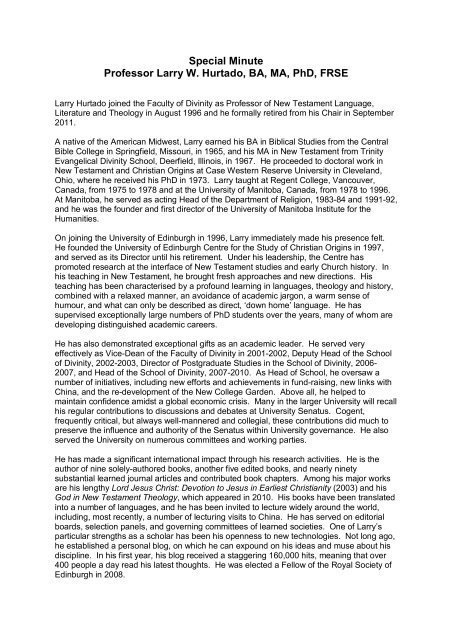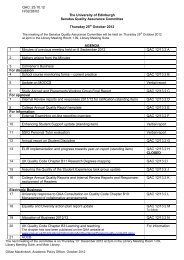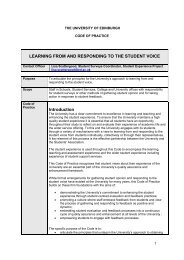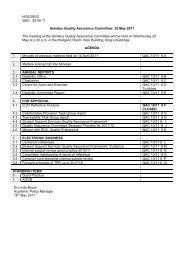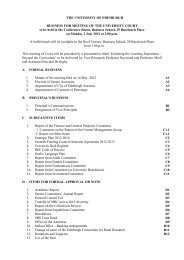H/02/02/02 eSenate: January 2012 The University of Edinburgh ...
H/02/02/02 eSenate: January 2012 The University of Edinburgh ...
H/02/02/02 eSenate: January 2012 The University of Edinburgh ...
- No tags were found...
Create successful ePaper yourself
Turn your PDF publications into a flip-book with our unique Google optimized e-Paper software.
Special Minute<br />
Pr<strong>of</strong>essor Larry W. Hurtado, BA, MA, PhD, FRSE<br />
Larry Hurtado joined the Faculty <strong>of</strong> Divinity as Pr<strong>of</strong>essor <strong>of</strong> New Testament Language,<br />
Literature and <strong>The</strong>ology in August 1996 and he formally retired from his Chair in September<br />
2011.<br />
A native <strong>of</strong> the American Midwest, Larry earned his BA in Biblical Studies from the Central<br />
Bible College in Springfield, Missouri, in 1965, and his MA in New Testament from Trinity<br />
Evangelical Divinity School, Deerfield, Illinois, in 1967. He proceeded to doctoral work in<br />
New Testament and Christian Origins at Case Western Reserve <strong>University</strong> in Cleveland,<br />
Ohio, where he received his PhD in 1973. Larry taught at Regent College, Vancouver,<br />
Canada, from 1975 to 1978 and at the <strong>University</strong> <strong>of</strong> Manitoba, Canada, from 1978 to 1996.<br />
At Manitoba, he served as acting Head <strong>of</strong> the Department <strong>of</strong> Religion, 198384 and 199192,<br />
and he was the founder and first director <strong>of</strong> the <strong>University</strong> <strong>of</strong> Manitoba Institute for the<br />
Humanities.<br />
On joining the <strong>University</strong> <strong>of</strong> <strong>Edinburgh</strong> in 1996, Larry immediately made his presence felt.<br />
He founded the <strong>University</strong> <strong>of</strong> <strong>Edinburgh</strong> Centre for the Study <strong>of</strong> Christian Origins in 1997,<br />
and served as its Director until his retirement. Under his leadership, the Centre has<br />
promoted research at the interface <strong>of</strong> New Testament studies and early Church history. In<br />
his teaching in New Testament, he brought fresh approaches and new directions. His<br />
teaching has been characterised by a pr<strong>of</strong>ound learning in languages, theology and history,<br />
combined with a relaxed manner, an avoidance <strong>of</strong> academic jargon, a warm sense <strong>of</strong><br />
humour, and what can only be described as direct, ‘down home’ language. He has<br />
supervised exceptionally large numbers <strong>of</strong> PhD students over the years, many <strong>of</strong> whom are<br />
developing distinguished academic careers.<br />
He has also demonstrated exceptional gifts as an academic leader. He served very<br />
effectively as ViceDean <strong>of</strong> the Faculty <strong>of</strong> Divinity in 200120<strong>02</strong>, Deputy Head <strong>of</strong> the School<br />
<strong>of</strong> Divinity, 20<strong>02</strong>2003, Director <strong>of</strong> Postgraduate Studies in the School <strong>of</strong> Divinity, 2006<br />
2007, and Head <strong>of</strong> the School <strong>of</strong> Divinity, 20072010. As Head <strong>of</strong> School, he oversaw a<br />
number <strong>of</strong> initiatives, including new efforts and achievements in fundraising, new links with<br />
China, and the redevelopment <strong>of</strong> the New College Garden. Above all, he helped to<br />
maintain confidence amidst a global economic crisis. Many in the larger <strong>University</strong> will recall<br />
his regular contributions to discussions and debates at <strong>University</strong> Senatus. Cogent,<br />
frequently critical, but always wellmannered and collegial, these contributions did much to<br />
preserve the influence and authority <strong>of</strong> the Senatus within <strong>University</strong> governance. He also<br />
served the <strong>University</strong> on numerous committees and working parties.<br />
He has made a significant international impact through his research activities. He is the<br />
author <strong>of</strong> nine solelyauthored books, another five edited books, and nearly ninety<br />
substantial learned journal articles and contributed book chapters. Among his major works<br />
are his lengthy Lord Jesus Christ: Devotion to Jesus in Earliest Christianity (2003) and his<br />
God in New Testament <strong>The</strong>ology, which appeared in 2010. His books have been translated<br />
into a number <strong>of</strong> languages, and he has been invited to lecture widely around the world,<br />
including, most recently, a number <strong>of</strong> lecturing visits to China. He has served on editorial<br />
boards, selection panels, and governing committees <strong>of</strong> learned societies. One <strong>of</strong> Larry’s<br />
particular strengths as a scholar has been his openness to new technologies. Not long ago,<br />
he established a personal blog, on which he can expound on his ideas and muse about his<br />
discipline. In his first year, his blog received a staggering 160,000 hits, meaning that over<br />
400 people a day read his latest thoughts. He was elected a Fellow <strong>of</strong> the Royal Society <strong>of</strong><br />
<strong>Edinburgh</strong> in 2008.


